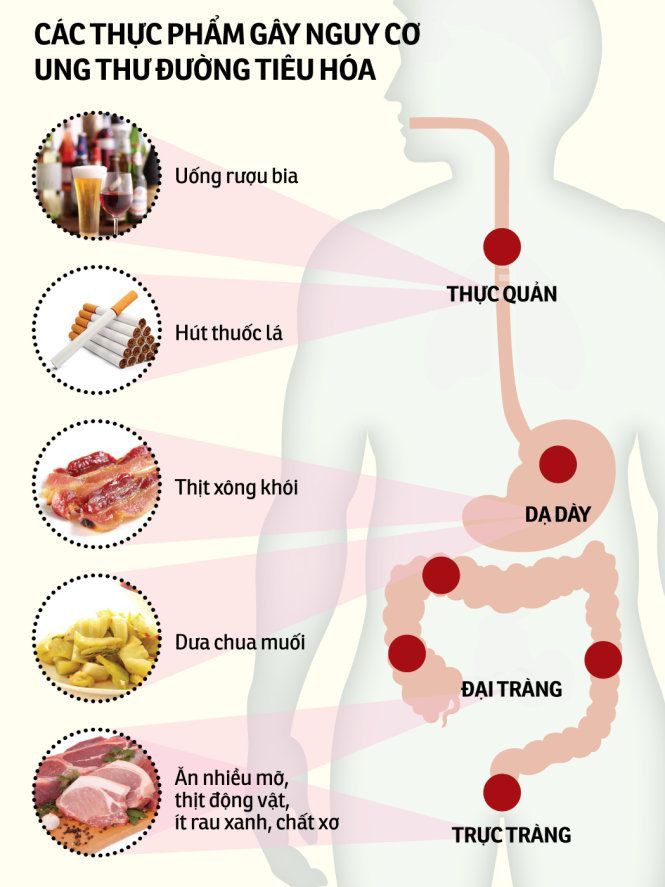Early detection of digestive cancer is possible.
The latest statistics show that gastrointestinal cancer is on the rise: colorectal cancer is among the six most common cancers and is on the rise.
According to Mr. Tran Van Thuan - Director of the Institute for Cancer Prevention Research, most patients with gastrointestinal cancer, including colorectal, stomach and esophageal cancer, come to the hospital at stage 2-3, but if detected early, treatment is much more effective.
Listen to your body for early detection
One of the patients with gastrointestinal cancer is musician TL. He just had surgery on Saturday, November 7 at Viet Duc Hospital, Hanoi with an initial diagnosis of colorectal cancer.
According to information from Viet Duc Hospital, musician TL's health is currently stable, but to definitively diagnose his illness, we must wait 4-7 days after surgery, after the pathology results are available.
However, according to doctors, the initial diagnosis was quite clear and musician TL underwent surgery just one day after being diagnosed with cancer.
Colorectal cancer ranks 6th among common cancers in Vietnam, with over 8,700 new cases and nearly 6,000 deaths per year.
 |
| Graphics: Tan Dat. |
According to Mr. Tran Van Thuan, digestive tract cancers such as colon, stomach, and esophagus have a clear tendency to increase. "Most patients with digestive tract cancer come to the hospital at stage 2-3, which is the middle stage of the disease. Almost no patients are diagnosed early when the disease has not yet shown initial signs," said Mr. Thuan.
Due to late detection of the disease, the mortality rate in patients with gastrointestinal cancer is very high, such as stomach cancer (ranked 4th among common cancers in Vietnam) with nearly 13,000 deaths/over 14,000 newly detected cases each year.
Meanwhile, according to Mr. Dao Van Long (Digestive Center of Bach Mai Hospital), if detected early and treated effectively, over 90% of patients with gastrointestinal cancer live for 5 years or more, but if detected late, when the tumor has metastasized, the 5-year survival rate is only 3-20%.
According to Mr. Long, the early detection methods currently available in Vietnam allow doctors to diagnose gastrointestinal cancer much earlier than before, when the tumor is still in its original location and has not metastasized. Thanks to endoscopic ultrasound equipment, doctors can “cut off” the mucosal area containing the tumor, instead of having to remove the stomach or colon area containing the tumor.
At Bach Mai Hospital alone, 30 stomach cancer patients and three colorectal cancer patients have been treated with this method with quite good results.
However, to detect the disease early, Mr. Tran Van Thuan recommends that people aged 40 and over should have regular general health check-ups. People with a family history of colorectal polyps, frequent dull pain in the epigastric region, a history of gastric ulcers, bloody stools... should have more frequent check-ups (including colonoscopy and gastroscopy) to detect the disease early.
Live healthy
Dr. Nguyen Van Dang (Hanoi Medical University) said there are many causes leading to digestive tract cancer. As society becomes more affluent, digestive tract cancer also increases.
According to Dr. Dang, a diet high in fat, animal meat, low in green vegetables and fiber is related to colorectal cancer. Many stomach cancer patients are related to a history of HP bacteria infection, nitrosamines in pickles and smoked meats, esophageal cancer is related to the habit of drinking a lot of alcohol and smoking a lot of cigarettes...
Although living in a tropical country with lots of fruits and vegetables, since 1985, the consumption of green vegetables in Vietnam has not only not increased but also decreased, only approximately 200 grams/person/day and only equivalent to 1/2 of the recommendation of the World Health Organization.
Meanwhile, the amount of meat, especially red meat (the World Health Organization has just concluded that consuming a lot of red meat is closely related to cancer) has increased continuously and in urban areas has far exceeded the recommendation, many urban families consume more than 100 grams of meat/person/day. Vietnamese people also eat very little food considered good for health such as fish and milk.
According to Ms. Le Bach Mai - Deputy Director of the National Institute of Nutrition, one of the reasons people are reluctant to eat vegetables is due to concerns about food hygiene, as well as a preference for eating meat over vegetables.
But while waiting to have safe vegetables, being more careful in choosing vegetables and changing lifestyle to prevent diseases and protect health is everyone's job - especially housewives.
Thep Alobacsi.vn
| RELATED NEWS |
|---|

